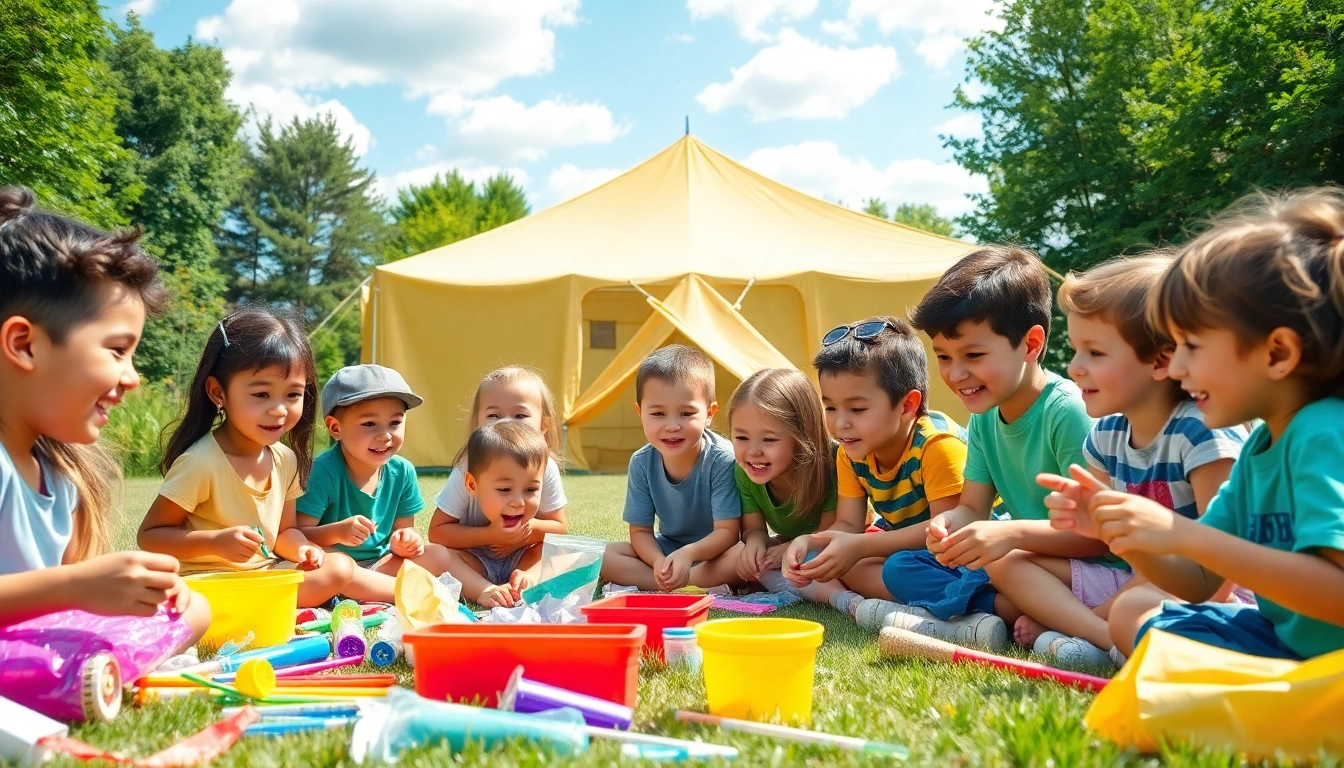Understanding Holiday Camps: Definition and Purpose
What are Holiday Camps?
Holiday camps are dedicated facilities that provide a variety of activities and accommodations for children, typically during school breaks or holiday seasons. These camps serve as a unique environment for learning and social interaction, offering scheduled programs that allow kids to engage in fun activities outside their traditional home settings. The essence of holiday camps lies in creating a structured yet enjoyable atmosphere where children can relax, explore, and make new friends.
The Concept of Holiday Camps
The concept of holiday camps originated in the early 20th century as a way for families to take vacations while ensuring that their children could participate in supervised, constructive activities. Unlike traditional vacations, which may focus only on relaxation and leisure, holiday camps facilitate a comprehensive experience combining education with play. Campers are often encouraged to immerse themselves in various activities that promote teamwork, creativity, and personal growth. Holiday camps have since evolved, offering diverse themes tailored to different age groups and interests.
Types of Holiday Camps Available
Holiday camps come in many varieties, each catering to different interests and age groups. The main types can be classified as follows:
- Day Camps: Typically operate during the daytime only, allowing children to return home each evening. These camps offer a variety of activities, including sports, arts, and crafts.
- Residential Camps: Children stay at the camp for a specified duration, often involving overnight accommodations. These camps may provide a more immersive experience, fostering community and independence.
- Specialized Camps: Focused on specific interests or activities, such as sports camps, arts camps, or science camps. These camps often provide expert instruction and more specialized resources.
- Thematic Camps: These camps revolve around a particular theme, such as environmental conservation, adventure, or cultural exploration, offering unique insights and activities related to that theme.
Benefits of Attending Holiday Camps
Social Skills Development
One of the primary benefits of attending a holiday camp is the opportunity for children to develop vital social skills. Engaging with peers in a camp environment encourages communication, cooperation, and conflict resolution. Campers learn to navigate social dynamics in a safe space, fostering friendships that can extend beyond the camp experience. Activities like team sports or group projects help boost collaboration skills and teach children the importance of respecting others’ opinions and emotions.
Physical Activity and Health
Physical health is another significant advantage of holiday camps. With an array of activities, such as hiking, swimming, and sports, children benefit from regular physical exercise, which is essential for their overall health and well-being. Engaging in these activities not only helps children develop their motor skills but also combats sedentary behaviors that can lead to health issues, such as obesity. Moreover, experiencing the outdoors can enhance mental health, reduce stress, and improve mood.
Creative Exploration and Learning
Holiday camps often provide children the chance to explore their creativity in a supportive environment. Many camps incorporate arts and crafts or STEM-related activities, allowing youngsters to express themselves and develop new skills. Learning through play is a powerful educational tool; children are more likely to absorb concepts when they are actively engaged in hands-on, creative tasks. Additionally, many camps promote experiential learning, where children can discover new interests and passions while receiving guidance from experienced instructors.
Activities Offered at Holiday Camps
Arts and Crafts Programs
Arts and crafts are staples at many holiday camps, enabling children to engage in creative expression through various mediums. These programs can range from painting and sculpture to photography and textile arts. Craft sessions not only enhance fine motor skills but also encourage innovative thinking. By providing children with the necessary materials and guidance, camps facilitate an atmosphere of creativity where children can explore different artistic styles and techniques. This creative process can be extremely fulfilling and boosts self-confidence as campers showcase their final products.
Sports and Adventure Activities
Sports play a crucial role in holiday camps, as they teach children about teamwork, discipline, and perseverance. Camps often include a range of sports from soccer and basketball to swimming and obstacle courses. Adventure activities, such as rock climbing, zip-lining, and nature hikes, encourage physical fitness and instill a sense of adventure among campers. These experiences are valuable for helping children become more active while developing essential life skills like goal-setting and resilience.
Educational Workshops and Learning Experiences
Many holiday camps integrate educational workshops into their programming, blending fun with learning. These workshops may cover various topics, from science experiments to coding and environmental studies. By incorporating educational elements into a playful format, camps motivate children to learn and explore subjects that may otherwise feel tedious. Learning in such dynamic contexts can raise children’s interest in subjects, paving the way for stronger academic performance in the future.
How to Choose the Right Holiday Camp
Factors to Consider When Selecting a Camp
When choosing a holiday camp, numerous factors should influence your decision. The child’s age, interests, and needs are paramount. For younger children, consider camps that offer a broad range of activities to cultivate varied interests. Older children may thrive in specialized camps that align with their passions, whether in the arts or sports. Additionally, logistical considerations, such as location, price, and duration, are critical factors, as they will affect the family’s overall experience with the camp.
Researching Camp Options
Before making a decision, thorough research is essential. Start by gathering recommendations from your child’s friends or local schools. Online resources can also be valuable; official camp websites offer insights into their mission, values, and programs. Look for reviews and testimonials from other parents, as they can provide a glimpse into the camp’s quality and safety. Consider reaching out to camp administrators to ask questions and get clarifications about their programs.
Evaluating Programs and Staff
It is crucial to evaluate the programs and staff at any potential holiday camp. Determine the camper-to-staff ratio and gauge the qualifications and background of the staff members working with your child. Experienced and well-trained staff can enhance the overall safety and nurturing environment of the camp. Additionally, inquire about the camp’s safety protocols, emergency procedures, and the types of training staff receives in health and safety matters.
Planning for a Successful Holiday Camp Experience
Preparing Your Child for Camp
Preparation plays a pivotal role in ensuring a positive camp experience. Begin by discussing the upcoming camp with your child to pique their interest. Talk about what to expect, the types of activities they will engage in, and emphasize the fun aspects. Practicing separation by having your child spend a night away from home can help ease their transition into a residential camp. Establishing a positive outlook and discussing any apprehensions openly can fortify your child’s confidence.
What to Pack for Holiday Camps
Packing appropriately for camp is vital to ensure that your child has everything they need. A comprehensive packing list might include:
- Clothing suitable for various weather conditions (layers are key)
- Comfortable and sturdy shoes
- Personal hygiene items (toothbrush, soap, etc.)
- Sun protection items (sunscreen, hats)
- Any medications prescribed (with instructions)
- A reusable water bottle
- Fun items like books or games for downtime
Encourage your child to help pack their bag, as this can foster a sense of ownership and excitement about their camp experience.
Tips for Parents During Camp Season
During the camp season, there are several strategies parents can utilize to support their children effectively. Check in with your child regularly, but do so in a way that encourages independence. Celebrate their achievements and any new skills they develop while at camp. Additionally, ensure communication is established with camp staff regarding any specific needs your child may have. Preparing care packages or writing letters can further enhance your child’s experience, reminding them that you are supportive and thinking of them.



